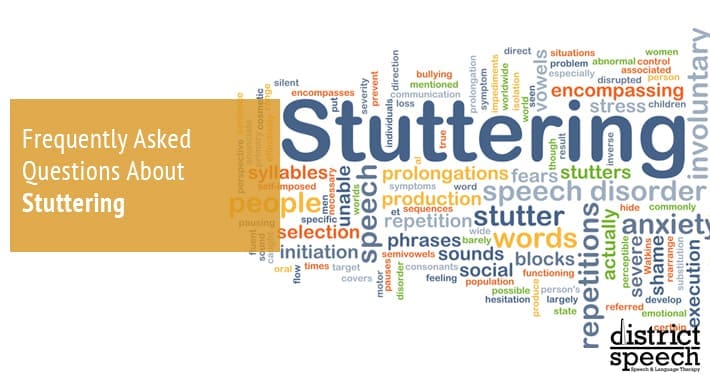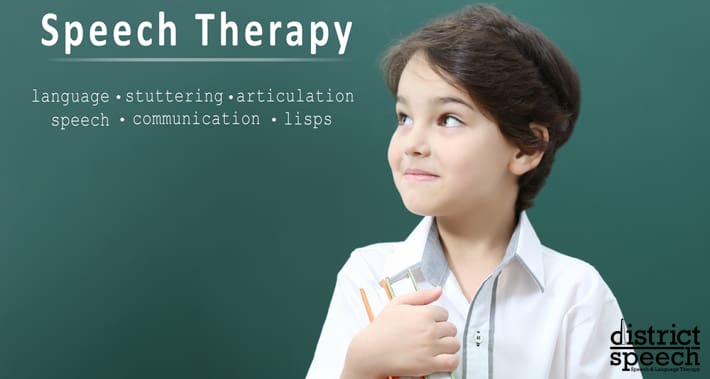
Most people don’t give much thought to their speech.
It’s just something we do, to get on with our days.
However, for people with speech disorders such as stuttering, a lot more thought goes into every single interaction.
Worrying about how they will be perceived by others, or if their speech disorder may result in lost opportunities due to others perception may lead some people to seek out speech therapy treatment for stuttering.
We’re District Speech, offering speech therapy in Washington DC and area, and today we want to address some common questions related to stuttering.
Keep reading to learn more.
What Is Stuttering?
Classified as a communication, or speech, disorder stuttering is characterized by repetitions, interruptions, and prolongations.
This can sound like speech which is interrupted or blocked (a long delay between words), repetitions (such as “he-he-hello”), and prolonged sounds (hiiiiiii).
These issues are called “disfluencies”, and although each is different, they are all forms of stuttering.
Stuttering may also be accompanied by facial tics such as unusual eye movements.
Is Stuttering Common?
Stuttering occurs in over seventy million people across the world, or roughly one percent of the population.
In the United States population this translates to approximately three million Americans who stutter.
This number is higher in children, as roughly five percent of children will have a period of stuttering, lasting at least six months.
However, some children who stutter in childhood will eventually outgrow it.
Stuttering is four times more prevalent in men than in women.
What Causes Stuttering?
There is no one single cause of stuttering which has been identified.
However, it’s believed to be a combination of a number of factors including:
- Genetics
- Physiological factors
- Experiential factors
- Environmental stressors
- Brain injury or trauma
- Stroke
- Traumatic brain injury
- Developmental issues
- Intellectual disabilities
- Brain physiology
- Drug use
When Does Stuttering Begin?
In most cases, stuttering starts in childhood, between the ages of five and twelve.
Of course, this doesn’t account for adults who may develop a stutter later in life, due to factors such as a stroke or other brain injury.
Stuttering will often appear when one is expected to communicate at a rate faster than they are developmentally able to or when under high pressure situations.
Often, when a child’s ability to control their speech catches up with the demand placed on them, stuttering will cease on its own.
Is Stuttering Linked With Emotional Issues?
There are two sides which need to be looked at when discussing stuttering as related to emotional issues.
Firstly, there is no evidence to suggest individuals who stutter are more emotionally insecure than those who don’t.
That is to say, it’s unlikely emotional issues are the cause of stuttering.
However, individuals who stutter may be more likely to lack confidence and remove themselves from social situations, as a result of embarrassment over their stutter.

Is There A Cure For Stuttering?
There is no one single cure for stuttering.
Anyone claiming they have a “miracle cure” to stop stuttering is selling snake oil, and this should be a red flag to run the other way.
Can Stuttering Be Treated?
Although there is no hard and fast cure for stuttering, there are speech therapy treatments which can help improve speech fluency and improve communication skills and confidence.
Pediatric speech therapists will also work with parents to help them develop techniques to help improve a child’s self esteem, and help them overcome issues related to stuttering.
Should I Seek Treatment For Stuttering For My Child?
If your child is showing signs of stuttering, early intervention is important, so they don’t have time to develop bad habits.
Although there are tips for parents who notice their child beginning to stutter, if it lasts longer than three to six months, or stuttering seems to be more severe, it’s best to seek the help of a speech therapist sooner rather than later.
This is because early intervention speech therapy tends to have much better results than waiting until your child is older.
How Does Speech Therapy Treatment For Stuttering Work?
The specific speech therapy treatments for stuttering will vary based on the needs of the child, including their age, and how severe stuttering is when treatment is sought.
It will often involve giving parents strategies which can be used at home, outside of formal therapy sessions to help strengthen fluency.
Treatment will generally take longer the older a child is, and individuals who don’t start therapy until a later age may never reach full fluency but can learn strategies to help them have better control over their speech.
Book Your Appointment With District Speech Today
Is your child showing signs of stuttering?
Or perhaps you’re an adult who has dealt with stuttering your whole life, and want to take control to help you get your confidence back.
Whatever the issues, we’re District Speech and we can help.
Servicing Washington DC and the surrounding area, we offer speech therapy services for both adults and children.
Contact our office today to set up a consultation.
1300 I St NW, #400E,
Washington, DC 20005
- https://g.page/districtspeech
District Speech and Language Therapy specializes in speech therapy, physical therapy, and occupational therapy solutions, for both children and adults, in the Washington D.C and the Arlington Virginia areas.